

The Civil Rights Movement in America 1945 to 1968 - History Learning Site. Civil Rights Movement - Black History. The civil rights movement was a struggle for social justice that took place mainly during the 1950s and 1960s for blacks to gain equal rights under the law in the United States.
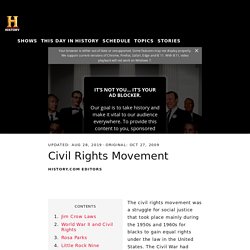
The Civil War had officially abolished slavery, but it didn’t end discrimination against blacks—they continued to endure the devastating effects of racism, especially in the South. By the mid-20th century, African Americans had had more than enough of prejudice and violence against them. They, along with many whites, mobilized and began an unprecedented fight for equality that spanned two decades. Jim Crow Laws During Reconstruction, blacks took on leadership roles like never before. Mahatma Gandhi - Biography - Anti-War Activist. Early Life Indian nationalist leader Mohandas Karamchand Gandhi, more commonly known as Mahatma Gandhi, was born on October 2, 1869, in Porbandar, Kathiawar, India, which was then part of the British Empire.
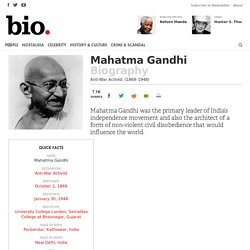
His father, Karamchand Gandhi, served as a chief minister in Porbandar and other states in western India. His mother, Putlibai, was a deeply religious woman who fasted regularly. Gandhi grew up worshiping the Hindu god Vishnu and following Jainism, a morally rigorous ancient Indian religion that espoused non-violence, fasting, meditation and vegetarianism. Young Gandhi was a shy, unremarkable student who was so timid that he slept with the lights on even as a teenager. Collaborating for Indigenous Rights 1957-1973. The Universal Declaration of Human Rights. The Universal Declaration of Human Rights, which was adopted by the UN General Assembly on 10 December 1948, was the result of the experience of the Second World War.
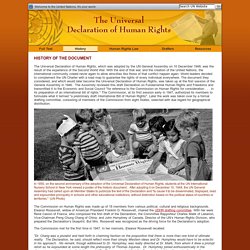
With the end of that war, and the creation of the United Nations, the international community vowed never again to allow atrocities like those of that conflict happen again. World leaders decided to complement the UN Charter with a road map to guarantee the rights of every individual everywhere. The document they considered, and which would later become the Universal Declaration of Human Rights, was taken up at the first session of the General Assembly in 1946.
Champions, Mahatma Gandhi, Cesar Chavez, Martin Luther King Jr. African Success : Biography of Kevin CARTER. South Africa > Media : Kevin CARTER Click on a picture to enlarge Born on 13/09/1960 (format : day/month/year)
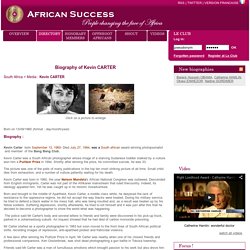
Mahatma Gandhi. Mahatma Gandhi. Eleanor Roosevelt. "What other single human being has touched and transformed the existence of so many?
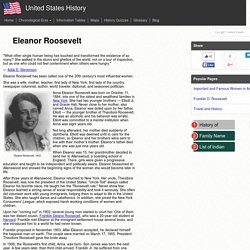
She walked in the slums and ghettos of the world, not on a tour of inspection, but as one who could not feel contentment when others were hungry. " — Adlai E. Stevenson Eleanor Roosevelt has been called one of the 20th century's most influential women. Eddie Mabo and Aboriginal Rights. Home > Aboriginal Studies > Part I - Social Justice and Human Rights > Global Perspective > Social Justice & Human Rights Issues: A Global Perspective Aboriginal and Indigenous responses and initiatives Indigenous Australian case study: Torres Strait Islands, Mer (Murray Island) and Eddie 'Koiki' Mabo The fight for social justice and human rights issues as told by his daughter Gail Mabo.
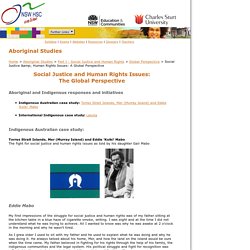
Eddie Mabo and the Mabo Land Rights Case. Born: 29th June 1936.
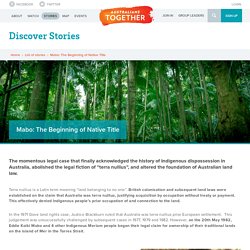
Douglas Nicholls. Collaborating for Indigenous Rights 1957-1973. Petitions were an effective way of mobilising support for Indigenous civil rights, and were used throughout the period leading up to the 1967 Referendum.
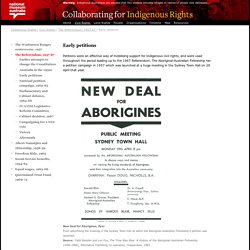
The Aboriginal-Australian Fellowship ran a petition campaign in 1957 which was launched at a huge meeting in the Sydney Town Hall on 29 April that year. New Deal for Aborigines, flyer Flyer advertising the meeting in the Sydney Town Hall at which the Aboriginal-Australian Fellowship's petition was launched.Source: Faith Bandler and Len Fox, The Time Was Ripe: A History of the Aboriginal-Australian Fellowship (1956-1969), Alternative Publishing Co-operative, Chippendale, 1983.
Martin Luther King Jr - Civil Rights Leader and Peace Advocate - Abolish Foreignness. Every nation – Martin Luther King Jr.
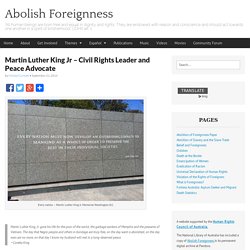
Memorial Washington D.C. Martin Luther King, Jr. gave his life for the poor of the world, the garbage workers of Memphis and the peasants of Vietnam. Martin Luther King. Rachel Corrie. Rachel Corrie Rachel Corrie was a 23-year-old American peace activist from Olympia, Washington, who was crushed to death by an Israeli bulldozer on 16 March 2003, while undertaking nonviolent direct action to protect the home of a Palestinian family from demolition.
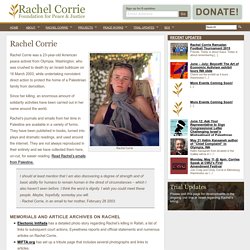
Since her killing, an enormous amount of solidarity activities have been carried out in her name around the world. Rachel’s journals and emails from her time in Palestine are available in a variety of forms. Nelson Mandela. African Success : Biography of Nelson MANDELA. South Africa > Politics : Nelson MANDELA Click on a picture to enlarge Born on 18/07/1918 (format : day/month/year) Biography : Nelson Rolihlahla Mandela (b. Nelson Mandela & the Fight Against Apartheid. To the Teacher: Nelson Mandela's death on December 5, 2013, is being marked by people around the world. Mandela, the former president of the Republic of South Africa and Nobel Peace laureate, spent more than 40 years—27 of them in prison—as a central figure in the struggle against South Africa's brutal and restrictive racial regime called apartheid. Asma Jahangir - Pakistan′s fearless rights campaigner.
Jahangir is to receive this year's Right Livelihood Award - also called the "alternative Nobel prize" - on Monday, December 1, along with US whistleblower Edward Snowden, British journalist Alan Rusbridger, Sri Lankan rights activist Basil Fernando, and US environmentalist Bill McKibben in Stockholm, Sweden. The Sweden-based award "honors courageous and effective work for human rights, freedom of the press, civil liberties and combating climate change," according to a statement released by the Right Livelihood Award committee on Wednesday, September 24. Created in 1980, the annual award acknowledges efforts that its founder Jacob von Uexkull felt were being ignored by the Nobel Prizes. 62-year-old Jahangir is Pakistan's leading human rights activist and a former president of the South Asian nation's Supreme Court Bar Association. 'It is a tribute to a large number of Pakistanis who have worked relentlessly for better human rights,' says Jahangir An award 'for all activists' A long struggle.
Asma Jahangir. “…for defending, protecting and promoting human rights in Pakistan and more widely, often in very difficult and complex situations and at great personal risk.” Asma Jahangir is Pakistan’s leading human rights lawyer. For three decades, she has shown incredible courage in defending the most vulnerable Pakistanis – women, children, religious minorities and the poor. Having founded the first legal aid centre in Pakistan in 1986, Jahangir has courageously taken on very complicated cases and won. For her relentless campaigning against laws that discriminate against women, and for continuously speaking truth to power, Jahangir has been threatened, assaulted in public and placed under house arrest.
She made history when she was elected as the first female President of the Supreme Court Bar Association of Pakistan in 2010. José Ramos-Horta. First published 16 December 2000. Reviewed 17 January 2007 Country: East Timor (now Timor-Leste). Desmond Tutu. Desmond Tutu - Archbishop - Biography.com. Profile: Malala Yousafzai. Image copyright Reuters Pakistani schoolgirl Malala Yousafzai wrote an anonymous diary about life under Taliban rule in north-west Pakistan. She was shot in the head by militants for daring to go to school. In 2014 she became the youngest person ever to win the Nobel Peace Prize. Accepting the award in Oslo she said she was "humbled" and proud to be the first Pashtun and the first Pakistani to win the prize. She also joked that she was probably the first winner who still fought with her younger brothers.
Malala Yousafzai first came to public attention through that heartfelt diary, published on BBC Urdu, which chronicled her desire to remain in education and for girls to have the chance to be educated. When she was shot in the head in October 2012 by a Taliban gunman, she was already well known in Pakistan, but that one shocking act catapulted her to international fame. Image copyright Birmingham Hospitals Trust Malala was only 11 years old when her anonymous diary captivated audiences.
Malala Yousafzai - Children's Activist, Women's Rights Activist.